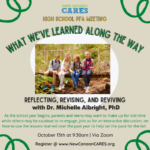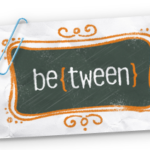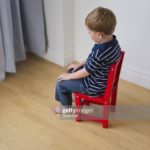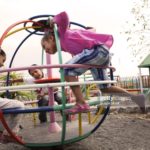PARENTING TOOLKIT
CARES Programs & Resources

CARES Program, Speaker: Lenore Skenazy
After her newspaper column “Why I Let My 9-Year-Old Ride the Subway Alone” landed her on NPR, Fox News, and everywhere in between, Lenore wrote Free-Range Kids, the book-turned-movement. She has been profiled in The New Yorker, hosted the reality show “World’s Worst Mom,” and has lectured everywhere from Disney to Microsoft to schools across the country.

CARES Program, author Katherine Wintsch
No one is perfect. How do we make peace with our imperfections and learn to celebrate ourselves? This program will help you understand why it’s essential to recognize our shortcomings and move forward, not just accepting, but also celebrating who we are.

CARES Program, October 2021
with Dr. Lauren Pote, PhD.
Leave feeling empowered understanding: How children interact at different ages and how healthy relationships develop, ways to foster independence in your child while navigating friendships, how to talk to your children about the “typical” challenges they may encounter, and how/when can parents get involved

CARES Program, Andree Palmgren, LPC
Ready for spring? We sure are! A new season is a wonderful time to reset our parenting priorities and revive our teens’ developing sense of independence and autonomy. Spring will bring more opportunities for our teens to gather with their friends outside. How do we balance our teen’s social needs with our family’s guidelines?

CARES Program, Dr. Lisa Damour, Dr. Michael Reichert
It is not boy versus girl. It is boy AND a girl. What is the same and what is different? Why should we differentiate them? Join Dr. Lisa Damour and Dr. Michael Reichert for an evening filled with lessons, myth busters and more.

CARES Program, October 2021
with Dr. Michelle Albright, PhD. As we sprint out of the gate, how do we keep the important family time & lessons we’ve learned intact? Family paths may have taken different twists and turns but remembering how we got there, is what matters. Set the pace for fall with tips and strategies to keep your family dynamics on the right path.

CARES Program, Amy Alamar, EdD
Raising healthy children with an ability to sustain meaningful relationships is a challenge even in the most ideal situations. Add on hormones, attitude, personality, and technology – welcome to tween and teen years. A recording of this program can be viewed here.

CARES Program, Amanda Craig, PhD, LMFT
The stage between elementary and teen years is a little window called the tweens years where we see massive brain restructuring that will change our little kids into legit middle schoolers. The changes impact their social and emotional development in big ways.

CARES Program, Alexandra Potts
Understand and embrace the person your child will become. Our children will likely lead lives that are very different from ours. Our job is to help them understand themselves so they can thrive. It is not our job to make them happy nor make it all easy for them.

CARES Program, Cristina Young, LCSW
Cristina Young will address the importance of good self-care since this quarantine will require sustainability out of all of us. Cristina will provide concrete strategies that parents can put into action at the dinner table that night. Learn tips on how to manage conflicts, improve communication, and strengthen relationships within the family.

CARES Program, Dr. Lauren Pote
Come learn about friendship skills during each developmental stage. What can we expect our children to understand about friendship and how can we help them while fostering their independence?

CARES Program
Learn how to help your child get organized and the best way to plan ahead for success in school!

CARES Program<i?
Learn about positive discipline for preschool and elementary students in this program.

CARES Program
Do you feel sandwiched with the challenges of being a caregiver for an older family member while raising your own children? This panel will cover caregiver roles, adjusting expectations and alleviating caregiver stress.

CARES Program, Cristina Young, LCSW
Parents will learn to anticipate and understand the typical conflicts that arise with teens based on recent brain research. Parents will learn how to manage the emotions teens trigger in them. Parents should leave feeling better equipped to handle the highs and lows of the adolescent years.

CARES Program, Amanda Craig, PhD, LMFT
This winter may seem a little different than years before. Our younger children have gone through a massive pandemic and as winter approaches they may be gearing up for another round of isolation or an interruption in their social interactions

New Canaan CARES
Meaningful moments (it doesn’t have to be hours but it has to be time when
you are focused on them) with your child create a sense of connection which
builds resilience!

New Canaan CARES
Homework can be tough for families in this busy day and age. Everyone is tired after a long day, and the activities schedule is packed. However, homework provides a time to review learning, prepare for the next day and to develop responsibility. Here are some thoughts to help you approach homework in a way that will have long-term value.

New Canaan CARES
Volunteer with your family and promote a family culture of caring.

New Canaan CARES, Jake Kircher
Our students are facing tremendous presumes: athletic, academic, social, and scheduling. How can we as parents help our students navigate these pressures?

New Canaan CARES, Bunny Potts
Getting the most out of your parent-teacher conference: There are so many topics that parents and teachers discuss at conference time that the time slides by all too fast. Here are some hints to help you maximize the upcoming conference times with teachers.
Additional Resources


Parents.com
Having a hard time getting your children to follow directions? Me too. So my friends and I decided to try our own group therapy. Don’t laugh—it works!

Child Mind Institute
We want our kids to be appreciative and not take things for granted, and learning to be grateful can improve kids’ relationships, ability to empathize, and overall happiness. If you are looking for ways to reinforce the importance of gratitude or would like to find other meaningful ways your kids can show appreciation, here are some tips

Search Institute
Children who have high levels of these assets get involved in fewer risky behaviors and are much more likely to exhibit the positive values, such as leadership, good health, diversity and success in school. We all have the power to build assets in our young people.

Huffpost
One of the most powerful ways that children learn is by playing, the American Academy of Pediatrics (AAP) emphasized. Play also helps buffer toxic stress, improves executive functioning, and builds relationships.


Your Teen Magazine
We all lose it with our kids sometimes. For many of us, the teen years can be rough. It’s not that teenagers are inherently terrible (really, I promise, they’re not), or that we parents are inherently flawed (again, I promise, we’re not). The point here is that conflict with your teen is a normal part of the parent-child relationship, and it doesn’t necessarily mean that you are doing anything wrong or that there is anything wrong with your kid.

Child Mind Institute
Why are holidays so fraught? Because expectations are heightened, and holidays can feel like a test of how happy and successful your family is. And if you have children with psychiatric or learning disorders, even favorite traditions can turn into a test of stamina and patience

Big Life Journal
Being mindful is a great SUPERPOWER to have because it can help you feel
calm, focus, and even become healthier! And like with anything else, the more you practice the better you become at it. So start practicing being mindful using these Mindful Brain Breaks!

MindBodyGreen.com
“My hope for the mindfulness class was to give the kids some tools they can use anytime: tools to calm down, slow down and feel better when they are troubled. I sure wish I had these tools at my disposal when I was their age. Imagine if all the children around the Earth learned to use these tools during their childhoods. What a change our world would experience within just one generation!”

Alexandra Potts
We live in a very privileged yet demanding community where children have countless options for school-based and extra-curricular activities. This is the good news and the bad news. Each family must set its own course based on their own values and goals as well as the needs and wants of their children.

NPR
Have you ever paid your kid for good grades? Have you driven to school to drop off a forgotten assignment? Have you done a college student’s laundry? What about coming along to Junior’s first job interview? Parents are too worried about their children’s future achievements to allow them to work through the obstacles in their path

Child Development Institute
The goal of parenting is to teach kids to develop self-discipline. When parents learn and apply the three Fs of Effective using the parenting techniques in this article, they find that yelling, screaming, and spanking disappear and a positive relationship is established.

Aha! Parenting
When your child is hijacked by adrenaline and other fight or flight hormones, he can’t learn. Remember that all “misbehavior” is an expression, however misguided, of a legitimate need.

American Academy of Child and Adolescent Psychiatry
A role model is a person who serves as an example by influencing others. For many children, the most important role models are their parents and caregivers. Children look up to a variety of role models to help shape how they behave in school, relationships or when making difficult decisions.

Child Mind Institute
As kids get older, boundaries for social interaction are important too. They need to learn to set boundaries for themselves and respect those of others. And that takes empathy — being able to recognize what others want and need, as well as what they themselves want and need.

YourTeenMag.com
The Parenting Paradox—We Want Them to be Independent, But . . .

Happily Family
Sometimes kids just need a good cry and to be held. But what are the other ways we can help our kids to calm down? And what about our own feelings? If we can calm ourselves down, then we role model and teach our kids to handle their own feelings.

Child Mind Institute
Holidays are supposed to be happy family events, but a lot of times they can be very stressful.

FilterFreeParents.com
“Dear Parent: This is the letter that I wish I could write. This fight we are in right now. I need it. I need this fight. I can’t tell you this because I don’t have the language for it and it wouldn’t make sense anyway. But I need this fight. Badly.”

Child Mind Institute
The teenage years have a lot in common with the terrible twos. During both stages our kids are doing exciting new things, but they’re also pushing boundaries (and buttons) and throwing tantrums. The majordevelopmental task facing both age groups is also the same: kids must pull away from parents and begin to assert their own independence. No wonder they sometimes act as if they think they’re the center of the universe.

Parents.com
While you want to make your children happy, you also want to raise kind, compassionate people. You want them to become grateful and appreciative adults. Find the perfect balance with these expert tips.

ReachOut.com
A self-care plan can help you enhance your health and wellbeing, manage your stress, and maintain professionalism as a worker with young people. Learn to identify activities and practices that support your wellbeing as a professional and help you to sustain positive self-care in the long-term.

